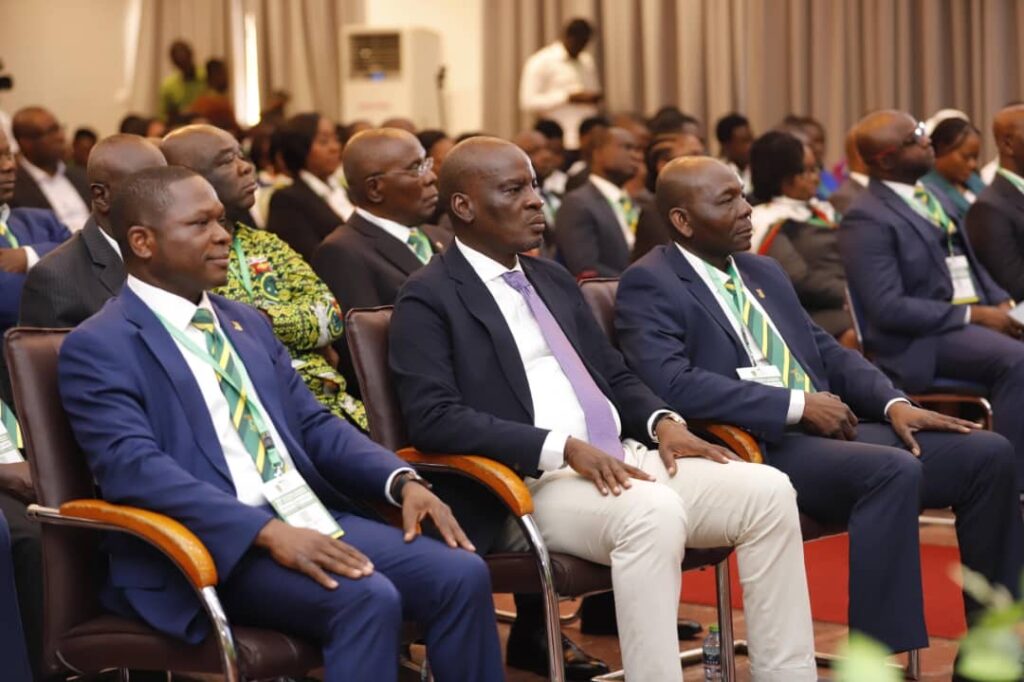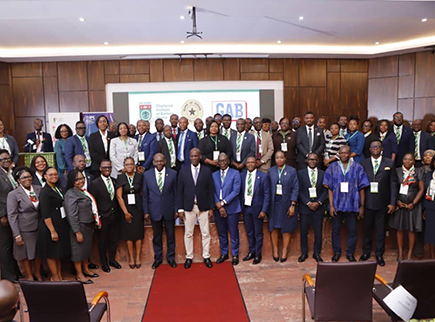The Chartered Institute of Bankers (CIB) Ghana has successfully wrapped up the 29th National Banking and Ethics Conference in Accra with a launch of its two new professional programmes.
The programmes are the Ethics 2.0 Programme and the Non-Interest Banking and Finance Certification Programme aimed at strengthening ethics, competence, and sustainability within Ghana’s financial system
The conference brought top regulators, policymakers, and industry leaders on the theme: “Building Future-Ready Banks: Ethical Leadership, Sustainable Finance, and Currency Stability amid Disruption.”
Mr. Benjamin Amenumey, FCIB, President of CIB Ghana, reaffirmed the Institute’s statutory mandate under Act 991 (2019) to promote the study and practice of banking in Ghana.
He said ethics and professionalism remained the foundation of a resilient financial system.
“Banking is first and foremost a trust profession. Where trust is strong, stability is possible. Where trust is weak, the system is at risk,” Mr. Amenumey noted.
He outlined recent initiatives by the Institute to deepen professional competence, including the revised Associate Chartered Banker (ACIB) curriculum, the Chartered Banker for Executive Leadership (CBEL) programme, the Branch CEO Programme, and the Digital Banking Academy.
He also highlighted the Environmental, Social, and Governance (ESG) Certification Programme, developed in partnership with the International Finance Corporation (IFC) and the Environmental Protection Agency (EPA), as a critical step in advancing responsible and sustainable finance in Ghana.
Mr. Robert Dzato, CEO of CIB Ghana, described the launch of Ethics 2.0 and the Non-Interest Banking and Finance Certification as a defining milestone in the Institute’s mission to build a trustworthy and future-ready banking profession.
“The currency in banking is trust. Trust is built through character, competence, and consequence, and that is what we are building in Ghana’s banking workforce,” Mr. Dzato said.
He revealed that over 9,000 banking professionals had already completed the earlier Ethics 1.0 Programme, developed jointly with the Bank of Ghana (BoG), and that Ethics 2.0 would expand this framework to all levels of the banking profession, including executives and board members.
He added that, in accordance with a new directive from the central bank, all banking staff would now be required to obtain CIB’s ethics certification, while branch managers must attain the Chartered Banker (ACIB) qualification within the next five years.
He explained that the Non-Interest Banking and Finance Certification, reflected the Institute’s commitment to supporting Ghana’s evolving landscape by promoting ethical, inclusive, and Sharia-compliant financial services.
Dr. Johnson Pandit Asiama, Governor of the Bank of Ghana (BoG), in a speech read on his behalf by the Director of Banking Supervision Department at the Bank, Mr. Ismail Adam commended the CIB for its leadership in fostering professionalism and ethical discipline across the industry.
He cautioned that while Ghana’s financial system has become more stable, ethical lapses and fraud remain serious threats to public confidence.
“Unethical practices remain widespread, with staff-related fraud on the rise. These issues threaten institutional integrity and underscore the need for stronger ethical frameworks and accountability,” Dr. Asiama said.
He reaffirmed that the Ethics Certification Programme would be integrated into the BoG’s fit-and-proper assessment criteria for senior managers and board members, signalling the regulator’s commitment to deepening professional integrity within the financial sector.

Mr Haruna Iddrisu, Minister for Education, commended the Institute’s ongoing partnership with the central bank.
He called for a fully independent BoG to safeguard monetary policy integrity.
He urged banks not to allow themselves to be used as conduits for unethical financial practices, stressing that “many of the unethical and corrupt monies in this country pass through the banking system.”
He said the Ministry of Education was collaborating with CIB Ghana and the National Council for Curriculum and Assessment (NaCCA) to integrate financial ethics and literacy into Ghana’s educational framework to nurture integrity and responsibility among future professionals.

